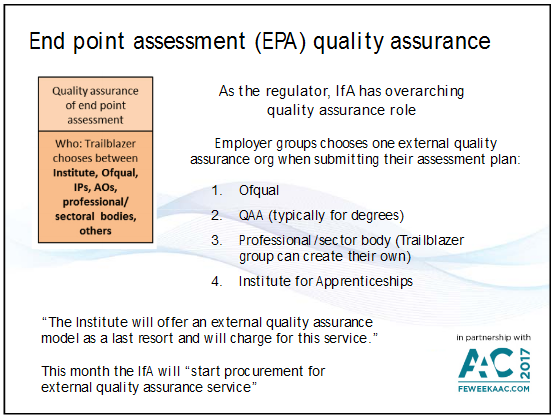The government exams watchdog has voiced fears that responsibilities within the current apprenticeship system have become “blurred”.
In its response to the operational plan for the Institute for Apprenticeships, published this morning, Ofqual branded the “responsibilities and accountabilities” in the system “blurred”, adding that it was “crucial” to make the landscape “clear and easy to navigate”.
“We consider it essential that the operational plan draws effectively on the strengths of the partner organisations and minimises duplication”, the report said.
“This is crucial if we are to enable apprentices, employers and those involved in developing and delivering apprenticeships to understand the system, use it effectively, and have confidence in those securing quality.”
The government’s consultation on how the Institute for Apprenticeships proposes to carry out its functions ran from January 27 to February 27, and feedback is currently being analysed.
Ofqual’s response particularly highlighted the need for “immediate clarification” of the role of external quality assurance.
It said: “The operational plan fails to make the distinction between the EQA function and the substantial regulatory powers that are uniquely available to us as a statutory regulator.
“Where an apprenticeship end point assessment falls within a regulated awarding organisation’s scope of recognition, we will regulate the EPA, no matter who is providing the EQA.
“In doing so, we will provide the same degree of quality assurance to EPAs that we give to the qualifications we regulate.”
The Institute for Apprenticeships should be working with Ofqual and other key partners in the system to develop “an appropriate EQA landscape”, it added.
The aims of this would be avoiding “duplication of responsibilities”, minimising “regulatory burden” and securing “value for money”.
The regulator also proposed the building of “productive working arrangements” with sector and professional bodies, where they are chosen to deliver EQA, in order to provide “assessment expertise and regulatory powers”, and help the system of quality assurance to be more “consistent”.
“Where Ofqual is not involved in regulating EPAs, the Institute will want to be satisfied that the quality assurance function enables similar levels of assurance and control over standards to be applied,” it warned.
Sally Collier, Ofqual’s chief regulator, said: “Our response to this important consultation underlines our commitment to support the IfA in ensuring that assessments within apprenticeships are consistent and of high quality.”
Currently, when employer Trailblazer groups submit their assessment plans for new apprenticeship standards, they must choose one external quality assurance organisation out of four options: Ofqual; the Quality Assurance Agency, which generally deals with higher education qualifications; a professional or sector body, which the Trailblazer group can create themselves if desired; or the Institute for Apprenticeships itself (see slide below).
On February 7, FE Week reported that the Institute for Apprenticeships would charge apprenticeship assessment organisations for external quality assurance of new standards , despite Ofqual keeping the service free.
, despite Ofqual keeping the service free.
Speaking during a webinar on January 6, Peter Lauener, shadow chief executive of the IfA, said that it was acceptable for the Institute to charge for the service because “the principle of a regulator charging bodies in the industry for regulation is not uncommon at all”.
Mr Lauener confirmed that if the Institute was chosen by employers to provide this service it would charge, but “any end point assessment the Institute provides itself would be provision of last resort”.
In the recent 200th edition of FE Week, Gemma Gathercole, head of funding and assessment at FE Week publisher Lsect, argued that the assessment community is calling for Ofqual’s role in apprenticeships to be extended.
She warned that “it is not common for the regulated to be calling for their regulator to have more power”, adding “we are adding further complexity into a system that almost everyone already thinks is too confusing”.








Your thoughts